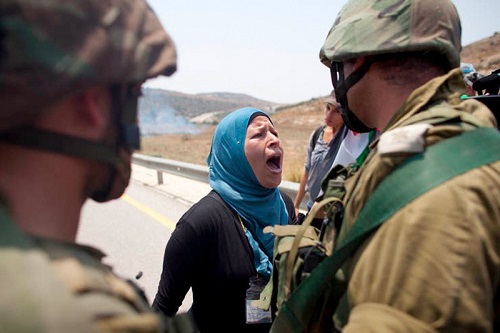AFP photo
By
Rupen Savoulian
A few months ago, we wrote about the issue of free speech, and specifically the Australian politicians who were most zealous in their desire to defend this noble ideal. Several ultra-right wing political figures, Murdoch media commentators and free-market fundamentalist fanatics took up the cause of free speech when demanding the repeal of Section 18C, the provision of the Racial Discrimination Act that outlaws racially-motivated hate speech.
Over the last couple of months, there was a case which afforded the opportunity for the partisans of free speech to demonstrate their commitment to the cause. Sadly, these voices have failed to live up to the lofty goal of free speech. The Australian Federal government of Prime Minister Malcolm Turnbull denied an entry visa to a Palestinian human rights activist Bassem Tamimi, only a few hours before he was due to board a plane bound for Australia. He was scheduled to address the annual Marxism Conference in Melbourne, before travelling to other Australian cities to address various Australian audiences.
The decision to revoke Tamimi’s visa was justified by the Department of Immigration and Border Protection on the grounds that while Tamimi himself was no threat, Australian audiences may take offence at some of his views. Jeff Sparrow, writer for The Guardian, wrote that the free speech defenders were curiously silent on the denial of the Palestinian activist’s right to free speech.
Turnbull, Immigration Minister Dutton, and others in the federal government had subjected Australian audiences to strident denunciations of those who would restrict our right to free speech for months on end. The centrality of Middle East politics to international affairs is not being denied – but it is strange that we are being prevented from hearing the views of the Palestinians, whose lives and plight are central to the politics of the Middle East.
Bassem Tamimi comes from the town of Nabi Saleh in the occupied West Bank. He and his fellow residents have organised peaceful protests against the ongoing encroachments of Israeli settlements onto Palestinian land. In 2012, the European Union designated Tamimi a human rights defender. Tamimi, a vocal critique of the Israeli occupation, has been subjected to sustained attacks and smears by Australian Zionist groups and their political allies.
During this entire debate, the free-speech warriors were remarkably absent, maintaining a studied silence on the issue. Sparrow, writing in the Guardian, highlighted this hypocrisy in his article. Tim Wilson, Liberal MP and policy director for the Institute for Public Affairs, was quite clear on the issue of free speech. He wrote that:
“We should always be wary when the government uses migration law to indirectly decide the views that can be expressed, and more importantly the views that Australians are allowed to hear.”
That is interesting he should state that – because he wrote that in 2015, defending the visit of Geert Wilders, the ultra-rightist Dutch Islamophobic political bigot. Wilders had ample opportunity to freely defend his views during his Australian tour. Interestingly, racist far-right politicians from Europe are vociferously anti-Islamic, and Wilders denies that Palestine even exists – but the historically anti-Semitic far-right are vigorously pro-Israel. Ultra-rightist parties in Europe, since the end of World War Two, have held a grotesquely cynical view; the optimal way to fulfil the anti-Semitic removal of European Jewry is to advocate for their tribal relocation to the Israeli state.
Wilders, back in 2015, expounded his views without any curtailment on his right to free speech. For the record, I oppose his brand of Islamophobic bigotry and anti-immigrant xenophobia. If anything, his views have incited others to commit acts of violence against ethnic minorities. Wilders and his Australian co-thinkers publicised their views, and achieved media coverage.
As for Tim Wilson – he is still silent on the banning of Bassem Tamimi.
************
Wilders was not the only ultra-rightist politician from overseas provided a platform to advocate his views. Israeli Prime Minister Benjamin Netanyahu, back in February 2017, became the first sitting Israeli prime minister to visit Australia in 70 years. His government is a coalition of far-right settler and ultra-Orthodox parties – similar to the attempted Tory-DUP coalition that British PM Theresa May is trying to achieve at the time of writing.
Netanyahu received an effusive welcome in Australia – he was feted by PM Turnbull, and had several rounds of dinners with business leaders and political figures. In the ruling circles of Australian politics, Netanyahu was greeted as a heroic statesman, with billionaires, financial moguls and political heavyweights (past and present) lining up to pay their respects to the Israeli prime minister. Australia’s relationship with Israel has been one of unstinting cooperation in all matters – political, economic and military. Dashiel Lawrence, a research fellow at the University of Melbourne, wrote that:
Relations between the two states have been buoyant for nearly seven decades. Australia has been famously described as a midwife at the birth the State of Israel in 1948. Doc Evatt, the head of the Australian delegation at the San Francisco conference in 1945, played a critical role developing Article 80 of the UN Charter. This paved the way for Jewish settlement in what was then known as Mandatory Palestine.
For his part, Turnbull has consistently identified with and defended the colonial-settler state in the Middle East. At least Turnbull is being ideologically consistent – the white settler-colonial state of Australia is a sister ally of the white settler-colonial state in the Levant. With Canberra’s solid defence of its ally in the Middle East, Australia has become complicit in the ongoing dispossession and displacement of the Palestinians. Netanyahu’s government has escalated the building of settlements in occupied Palestinian territories, creating facts on the ground in order to push for greater advantage in any final peace settlement.
************
We have another important opportunity to revisit the Palestine issue in Australia. This month marks the 50th anniversary of the Six Day War. That war, during which Israel invaded and annexed East Jerusalem, the West Bank, the Gaza strip, the Golan Heights from Syria the Sinai from Egypt – is currently the longest running conventional military occupation in contemporary history. This war is still shrouded in myths and half-truths – the most egregious being that Israel faced the prospect of annihilation at the hands of the numerically superior Arab armies.
The Jewish David inflicted a stinging defeat on the Arab Goliath – at least that is what we have been told over the last fifty years. Israeli political and military leaders have exposed this myth with their own words; the Six Day war was a war of conquest and subjugation. One of the Israeli generals involved in the June 1967 admitted that the thesis that Israel was facing extermination was a complete fiction.
Surely it is time, fifty years after the event, to listen to the voices of those whose lives have been directly impacted by this occupation – the Palestinians? A re-examination of the lies and myths of the June 1967 is long overdue. Mehdi Hasan, writer for The Intercept, published an article entitled “A 50 Year Occupation: Israel’s Six-Day War started with a Lie.” Hasan explains that the conflict and subsequent occupation has had reverberations that have persisted until today:
Fifty long years of occupation; of dispossession and ethnic cleansing; of house demolitions and night curfews; of checkpoints, walls, and permits.
Fifty years of bombings and blockades; of air raids and night raids; of “targeted killings” and “human shields”; of tortured Palestinian kids.
Fifty years of racial discrimination and ethnic prejudice; of a “separate but unequal” two-tier justice system for Palestinians and Israelis; of military courts and “administrative detention.”
Fifty years of humiliation and subjugation; of pregnant Palestinian women giving birth at checkpoints; of Palestinian cancer patients denied access to radiation therapy; of Palestinian footballers prevented from reaching their matches.
Hasan also makes the obvious point – fifty years of ongoing settlement activity has been punctuated by successive and failed peace negotiations – Madrid, Oslo, Wye River – the list of treaties goes on. While peace talks continue, one side continues to construct settlements, thus capturing more ground and rendering any subsequent peace treaty futile. Building settlements sounds like an innocuous activity, until you realise that the purpose of these mini-garrisons is to expand the religiously-motivated tribalist project of extending exclusive Israeli control over greater portions of occupied Palestinian territory. Indeed, constructing settlements is a way of establishing a form of apartheid – and the United Nations has described in great detail how this resurrected apartheid is being built in the occupied Palestinian territories.
It is high time to listen to the voices of those who are subjugated to this apartheid regime, the Palestinians. We would do well to support the right of free speech for those whose lives are blighted by occupation. We must speak out against those who impose an apartheid-style regime.
Rupen Savoulian
I am an activist, writer, socialist and IT professional. Born to Egyptian-Armenian parents in Sydney, Australia, my interests include social justice, anti-racism, economic equality and human rights.



No Comments Yet!
You can be first to comment this post!